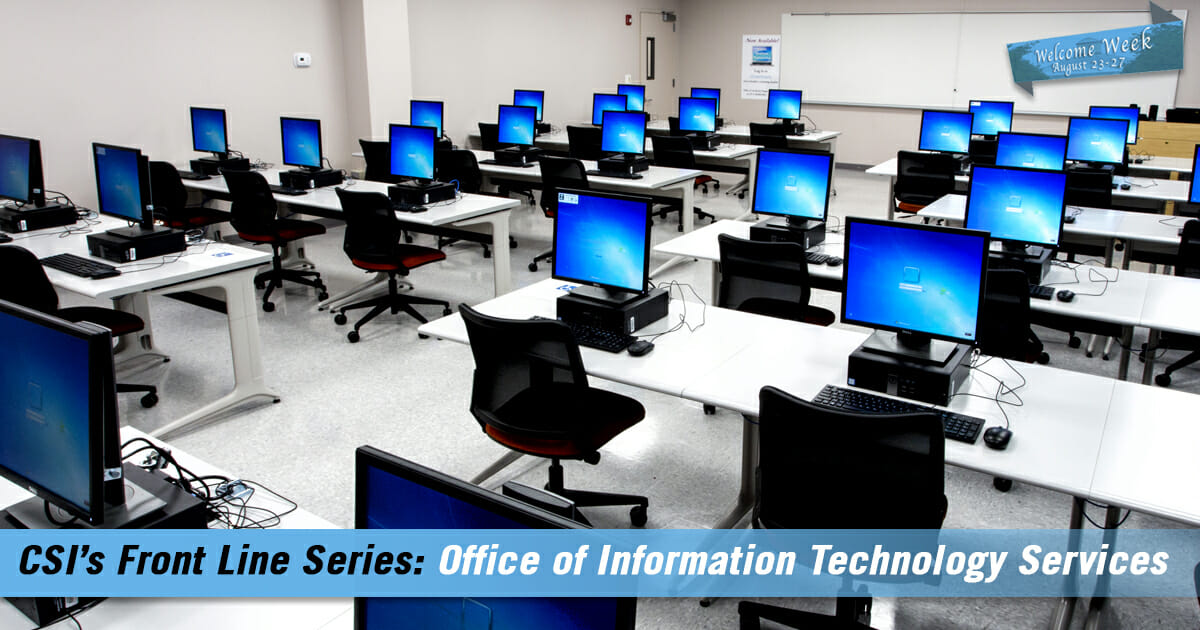This is the fifth in a series of articles in CSI Today that will examine the professional effects of the COVID-19 pandemic on the College’s Front Line Workers, and their determined efforts to ensure the safety of our campus.
The Office of Information Technology Services (OIT) has long played a critical role in so many operations that keep the College of Staten Island running. Some are very apparent, like when someone has a computer issue, or needs application support or training regarding email or some other technology. Others are behind the scenes, like computer, network, and connectivity upgrades. Without their vital services, the College would quickly grind to a halt.
Enter the pandemic and remote work and learning arrangements. For OIT, the landscape changed, but, as Patricia Kahn, Assistant Vice President and Chief Information Officer for Information Technology Services at the College of Staten Island, explained, many things had to essentially remain the same. Regarding the services that OIT provides, she said, “These functions never went away. What did change, however, was the way we delivered these functions. OIT never missed a beat on how we serviced our community and we met the challenge by providing these services remotely. Whether it was through virtual office hours; remote desktop management; account set up; virtual training; providing reports, inventory control, and imaging; converting our labs for students and faculty to virtually access software remotely via a secure environment, among others, the College community was able to thrive.”
As the College community prepares for a more in-person presence on campus for the Fall 2021 semester, OIT is an important part of that plan. AVP Kahn underscored the Number 1 priority of continuing to provide essential technical services to students, faculty, and staff, while remaining cognizant of health and safety guidelines. As a result, in-person computer labs will be open with proper social distancing protocols. Those students who continue to learn remotely will still have access to virtual labs. Another ongoing service will be the provision of devices to students so that they can participate in online and hybrid classes. “In that regard,” AVP Kahn said, “we are offering spaces on campus for students to use as study rooms, in addition to leveraging outdoor wireless options. All of this information will be available on our online resources Webpage.”
AVP Kahn noted that there are new innovations for students, this fall—Hyflex learning and enhanced Hybrid Smart Classrooms. “OIT has configured approximately 70 Smart classrooms with technology that will support students participating remotely at the same time the class meets face-to-face,” she explained. In addition, CSI faculty participated in the CUNY Hyflex pilot located in 1L-220A.
As she looks back on a harrowing 16 months, AVP Kahn stated that she has found that time to be “exhilarating, exhausting, and overwhelming! We are excited to provide the support and definitely have a sense of accomplishment when things work well and the College community takes advantage of the services we are offering. For example, we were able to provide remote access to lab computers for students who needed access to software from a remote location. This initiative required all of OIT staff to work together as a team and pull it off with limited resources. We were able to accomplish this without a hitch – and we received lots of kudos from students and faculty who leveraged these resources. However, it was not an easy lift. The same is true for many other initiatives that you may not realize because of the many behind-the-scenes projects that are underway to keep things operational.”
AVP Kahn was also able to find a bright spot during this challenging period. “OIT went above and beyond–often times providing support 24/7, and my team never complained. While I always realized how hard OIT staff worked, it definitely became even more apparent during these trying times.”
By Terry Mares



![[video] Dr. Fritz interviewed by NY1’s Anthony Pascale](https://csitoday.com/wp-content/uploads/2013/11/WJF-Anthony-Pascale-NY1.gif)











